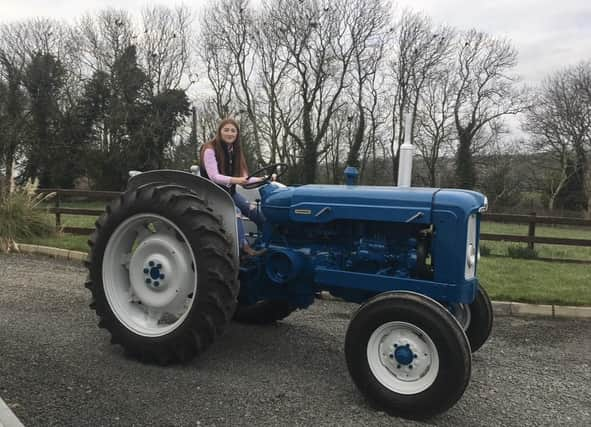Women in Agriculture profile featuring Sinead McAtamney


Occupation:
I am currently studying the Ulster University honours degree course ‘sustainable agriculture’, which is delivered at Greenmount college. I have taken a placement year this year and have recently completed a six-month placement on a dairy farm in South West Scotland. The farm is milking approximately 1,100 cows.
Farming commodity:
On my home farm we milk cows and rear all our calves for either replacement heifers or finishing beef. We also carry out a range of contracting jobs for local farmers.
How did you become involved in farming?
Advertisement
Advertisement
Growing up on the family farm I was always keen to get involved in all activities. From milking cows and feeding calves to drawing silage. The knowledge of the farming industry that I gained over the years has been very beneficial to me. In 2019 I got a part time job in my local agricultural merchant store. With my strong farming background, I was able to understand farmers needs and provide them with advice. Although some farmers found it difficult to believe me as I was the first woman to ever work in this role in the store.
Earliest farming memory:
One of my favourite memories is from calving a cow. Although I was too young to be of much help, I loved calving season. I remember it was in the early hours of the morning. I heard my father get up and go to the farm, so I got up and followed out behind him. He had to assist the cow and I held the cow’s tail out of the way. I remember thinking it was such an important job. When we got the calf out it wasn’t breathing. I remember we tried everything to get it breathing. Eventually my father gave up and went to check back on the cow. When he was gone, I continued to rub the calf and soon it started to move and make noises. My father came back and couldn’t believe the calf was alive. The feeling of bringing new life into the world is one that cannot be matched.
Personal characteristics that you have gained from agriculture:
Working in the agricultural sector has provided me with some great characteristics. I believe farming has made me a very caring and compassionate person. It has also made me friendly and outgoing. Patience is a key characteristic and one that I have gained through farming.
Life lesson:
Advertisement
Advertisement
The biggest life lesson that I’ve learnt through farming is that it doesn’t matter what others think, as long as you are happy and are making a change in the agricultural sector.
What do you enjoy the most about the farming lifestyle?
The thing I enjoy most about farming is spending time with family. I was grateful to work alongside my late grandfather for years. He was still farming at 89 years of age. My father and mother both work full time on the farm as well as my brother who is studying at Greenmount while also farming. My two sisters are also keen to lend a hand.
Describe a farmer in three words: Hardworking, caring and committed.
What would you like the public to know about Northern Ireland farming?
Advertisement
Advertisement
Farmers treat all their animals with the highest level of care. If an animal is sick, it is treated straight away to prevent it from suffering. Northern Ireland farmers continue to work so hard despite all the challenges thrown at them.
If you could give farmers/farming families/farming community one piece of advice, what would it be?
Look out for yourself and each other. Farming can be a lonely occupation, so it is important to look after your mental health and look out for others especially those who farm alone.
What would you say to others who are considering a career in the agriculture industry?
Advertisement
Advertisement
It’s going to be tough but it’s such a rewarding career and it will be worth it - go for it! There are so many career paths within the agriculture industry so there is something for everyone.
What are your hopes for the future of Northern Ireland’s agriculture industry?
I hope that there will be more help and support offered to farmers to allow them to continue to run a successful business. I also hope that the public realise just how important agriculture is and that they will continue to support farmers.